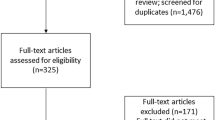Abstract
Cultural competence programs have proliferated in U.S. medical schools in response to increasing national diversity, as well as mandates from accrediting bodies. Although such training programs share common goals of improving physician-patient communication and reducing health disparities, they often differ in their content, emphasis, setting, and duration. Moreover, training in cross-cultural medicine may be absent from students’ clinical rotations, when it might be most relevant and memorable. In this article, the authors recommend a number of elements to strengthen cultural competency education in medical schools. This “prescription for cultural competence” is intended to promote an active and integrated approach to multicultural issues throughout medical school training.
Similar content being viewed by others
References
Resident population estimates for the US by sex, race, and Hispanic origin: April 1, 1990 to July 1, 1999, with short-term projection to November 1, 2000. Available at: http://www.census.gov/population/estimates/nation/intfile3-1.txt. Accessed October 28, 2005.
Projections of the resident populations by race, Hispanic origin, and nativity: middle series, 2016 to 2020. Available at: http://www.census.gov/population/projections/nation/summary/np-t5-e.txt. Accessed October 18, 2005.
Kleinman A, Eisenberg L, Good B. Culture, illness, and care: clinical lessons from anthropologic and cross-cultural research. Ann Intern Med. 1978;88:251–8.
Pachter LM. Culture and clinical care. Folk illness beliefs and behaviors and their implications for health care delivery. JAMA. 1994;271:690–4.
Flores G, Gee D, Kastner B. The teaching of cultural issues in U.S. and Canadian medical schools. Acad Med. 2000;75:451–5.
Race, ethnicity and medical care: a survey of public perceptions and experience. Available at: http://www.kff.org/minorityhealth/1529-index.cfm. Accessed October 18, 2005.
Borkan JM, Neher JO. A developmental model of ethnosensitivity in family practice training. Fam Med. 1991;23:212–7.
Carrese J, Rhodes L. Bridging cultural differences in medical practice. The case of discussing negative information with Navajo patients. J Gen Intern Med. 2000;15:92–6.
Bach PB, Cramer LD, Warren JL, Begg CB. Racial differences in the treatment of early-stage lung cancer. N Engl J Med. 1999;341:1198–205.
Canto JG, Allison JJ, Kiefe CI, et al. Relation of race and sex to the use of reperfusion therapy in medicare beneficiaries with acute myocardial infarction. N Engl J Med. 2000;342:1094–100.
Schulman KA, Berlin JA, Harless W, et al. The effect of race and sex on physicians’ recommendations for cardiac catheterization. N Engl J Med. 1999;340:618–26.
Trivedi AN, Zaslavsky AM, Schneider EC, Ayanian JZ. Trends in the quality of care and racial disparities in Medicare managed care. N Engl J Med. 2005;353:692–700.
Ayanian JZ, Cleary PD, Weissman JS, Epstein AM. The effect of patients’ preferences on racial differences in access to renal transplantation. N Engl J Med. 1999;341:1661–9.
Beach MC, Price E, Gary TL, et al. Cultural competence: a systematic review of health care provider educational interventions. Med Care. 2005;43:356–73.
Carrillo JE, Green AR, Betancourt JR. Cross-cultural primary care: a patient-based approach. Ann Intern Med. 1999;130:829–34.
Day TW. Cross-cultural medicine at home. Minn Med. 1992;75:15–7.
Riffenburgh RS. Communication in cross-cultural medicine practice. West Med Med J West. 1966;7:320–2.
Brach C, Fraser I. Can cultural competency reduce racial and ethnic health disparities? A review and conceptual model. Med Care Res Rev. 2000;57(suppl):181–217.
Liason Committee on Medical Education. Full text of LCME Accreditation Standards. Available at: http://www.lcme.org/stndtext.htm#educationalprogram. Accessed October 18, 2005.
Accreditation Council on Graduate Medical Education. ACGME Outcome Project. Available at: http://www.acgme.org/outcome/comp/compFull.asp. Accessed October 18, 2005.
U.S. Department of Health and Human Services: Office of Minority Health. National standards for culturally and linguistically appropriate services in health care. Available at: http://www.omhrc.gov/omh/programs/2pgprograms/finalreport.pdf. Accessed October 18, 2005.
Promoting, reinforcing, and improving medical education (PRIME) culture and diversity curriculum. Available at: http://www.amsa.org/programs/diversitycurriculum.cfm. Accessed October 18, 2005.
Beagan BL. Teaching social and cultural awareness to medical students: “it’s all very nice to talk about it in theory, but ultimately it makes no difference.” Acad Med. 2003;78:605–14.
Betancourt JR. Cross-cultural medical education: conceptual approaches and frameworks for evaluation. Acad Med. 2003;78:560–9.
Loudon RF, Anderson PM, Gill PS, Greenfield SM. Educating medical students for work in culturally diverse societies. JAMA. 1999;282:875–80.
Furman G, Dent MM. Seamless learning: incorporating cultural competency into the curriculum. Cultural Competency in Medical Education: A Guidebook for Schools: Department of Health and Human Services; 2004.
Crandall SJ, George G, Marion G, Davis S. Applying theory to the design of cultural competency training for medical students: a case study. Acad Med. 2003;78:588–94.
Anderson LM, Scrimshaw SC, Fullilove MT, Fielding JE, Normand J. Task Force on Community Preventive Services. Culturally competent healthcare systems. A systematic review. Am J Prev Med. 2003;24(suppl):68–79.
Weissman JS, Betancourt J, Campbell EG, et al. Resident physicians’ preparedness to provide cross-cultural care. JAMA. 2005;294:1058–67.
Hunt LM, Schneider S, Comer B. Should “acculturation” be a variable in health research? A critical review of research on US Hispanics. Soc Sci Med. 2004;59:973–86.
Salant T, Lauderdale DS. Measuring culture: a critical review of acculturation and health in Asian immigrant populations. Soc Sci Med. 2003;57:71–90.
Berlin EA, Fowkes WC Jr. A teaching framework for cross-cultural health care. Application in family practice. West J Med. 1983;139:934–8.
Kagawa-Singer M, Kassim-Lakha S. A strategy to reduce cross-cultural miscommunication and increase the likelihood of improving health outcomes. Acad Med. 2003;27:577–87.
Knowles M. The Adult Learner: A Neglected Species. Houston: Gulf Publishing Co.; 1973.
Colliver JA, Swartz MH. Assessing clinical performance with standardized patients. JAMA. 1997;278:790–1.
Wearne S. Role play and medical education. Aust Fam Physician. 2004;33:858.
DasGupta S, Charon R. Personal illness narratives: using reflective writing to teach empathy. Acad Med. 2004;79:351–6.
Yamada S, Maskarinec GG, Greene GA, Bauman KA. Family narratives, culture, and patient-centered medicine. Fam Med. 2003;35:279–83.
Erwin DO, Henry-Tillman RS, Thomas BR. A qualitative study of the experiences of one group of African Americans in pursuit of a career in academic medicine. J Natl Med Assoc. 2002;94:802–12.
Bowling JR. Clinical teaching in the ambulatory care setting: how to capture the teachable moment. J Am Osteopath Assoc. 1993;93:235–9.
King DE, Blue A, Mallin R, Thiedke C. Implementation and assessment of a spiritual history taking curriculum in the first year of medical school. Teach Learn Med. 2004;16:64–8.
Morell VW, Sharp PC, Crandall SJ. Creating student awareness to improve cultural competence: creating the critical incident. Med Teach. 2002;24:532–4.
Rabinowitz D, Melzer-Geva M, Ber R. Teaching the cultural dimensions of the patient-physician relationship: a novel approach using didactic trigger films. Med Teach. 2002;24:181–5.
Grainger-Monsen M, Haslett J. World’s Apart: A Four-part Series on Cross-cultural Healthcare. Boston, MA: Fanlight Productions; 2003.
Engler CM, Saltzman GA, Walker ML, Wolf FM. Medical student acquisition and retention of communication and interviewing skills. J Med Educ. 1981;56:572–9.
Groman R, Ginsburg J, American College of Physicians. Racial and ethnic disparities in health care: a position paper of the American College of Physicians. Ann Intern Med. 2004;141:226–32.
American Association of Medical Colleges. Minorities in Medical Education: Facts and Figures 2005. Washington, DC: American Association of Medical Colleges; 2005.
Barzansky B, Etzel SI. Educational programs in US medical schools, 2001–2002. JAMA. 2002;288:1067–72.
Collins KS, Hall A, Neuhaus C. U.S. Minority: A Chartbook. New York: The Commonwealth Fund; 1999.
Betancourt JR, Green AR, Carrillo JE, Ananeh-Firempong O II. Defining cultural competence: a practical framework for addressing racial/ethnic disparities in health and health care. Public Health Rep. 2003;118:293–302.
Fang D, Moy E, Colburn L, Hurley J. Racial and ethnic disparities in faculty promotion in academic medicine. JAMA. 2000;284:1085–92.
Evans RM. Increasing minority representation in health care management. Health Forum J. 1999;42:22.
Cooper-Patrick L, Gallo JJ, Gonzales J, et al. Race, gender, and partnership in the patient-physician relationship. JAMA. 1999;282:583–9.
Brotherton SE, Stoddard JJ, Tang SS. Minority and nonminority pediatricians’ care of minority and poor children. Arch Pediatr Adolesc Med. 2000;154:912–7.
Komaromy M, Grumbach K, Dake M, et al. The role of Black and Hispanic physicians in providing health care for underserved populations. N Engl J Med. 1996;334:1305–10.
Moy E, Bartman BA. Physician race and care of minority and medically indigent patients. JAMA. 1995;273:1515–20.
Rogers E. Diffusion of Innovations. New York: Free Press; 1983.
Hiss R, MacDonald R, David W. Identification of physician educational influentials in small community hospitals. Paper presented at the Seventeenth Annual Conference on Research in Medical Education, 1978; Washington, DC.
Borbas C, Morris N, McLaughlin B, Asinger R, Gobel F. The role of clinical opinion leaders in guideline implementation and quality improvement. Chest. 2000;118(suppl):24S-32S.
Thomson O’Brien MA, Oxman AD, Haynes RB, Davis DA, Freemantle N, Harvey EL. Local opinion leaders: effects on professional practice and health care outcomes. Cochrane Database of Systematic Reviews. 2005;4.
Turbes S, Krebs E, Axtell S. The hidden curriculum in multicultural medical education: the role of case examples. Acad Med. 2002;77:209–16.
Hafferty FW. Beyond curriculum reform: confronting medicine’s hidden curriculum. Acad Med. 1998;73:403–7.
Bertakis KD, Callahan EJ, Helms LJ, Azari R, Robbins JA, Miller J. Physician practice styles and patient outcomes: differences between family practice and general internal medicine. Med Care. 1998;36:879–91.
van Ryn M. Research on the provider contribution to race/ethnicity disparities in medical care. Med Care. 2002;40(suppl):1140–51.
Pena Dolhun E, Munoz C, Grumbach K. Cross-cultural education in U.S. medical schools: development of an assessment tool. Acad Med. 2003;78:615–22.
American Association of Medical Colleges. Tool for Assessing Cultural Competence Training (TACCT). Available at: http://www.aamc.org/meded/tacct/start.htm. Accessed April 25, 2006.
Cultural Competency in Medical Education: A Guidebook for Schools. Department of Health and Human Services; 2004.
American Academy of Pediatrics Committee on Pediatric Workforce. Culturally effective pediatric care: education and training issues. Pediatrics. 1999;103:167–70.
Flores G. Culture and the patient-physician relationship: achieving cultural competency in health care. J Pediatr. 2000;136:14–23.
Author information
Authors and Affiliations
Corresponding author
Additional information
Dr. Kripalani is currently funded by a K23 Mentored Patient-Oriented Research Career Development Award (K23 HL077597) and previously received support from the Emory Mentored Clinical Research Scholars Program (NIH/NCRR K12 RR017643) while writing this manuscript. A portion of this paper was presented at a meeting of the Southern Anthropological Society in March 2004.
Rights and permissions
About this article
Cite this article
Kripalani, S., Bussey-Jones, J., Katz, M.G. et al. A prescription for cultural competence in medical education. J GEN INTERN MED 21, 1116–1120 (2006). https://doi.org/10.1111/j.1525-1497.2006.00557.x
Received:
Revised:
Accepted:
Issue Date:
DOI: https://doi.org/10.1111/j.1525-1497.2006.00557.x




